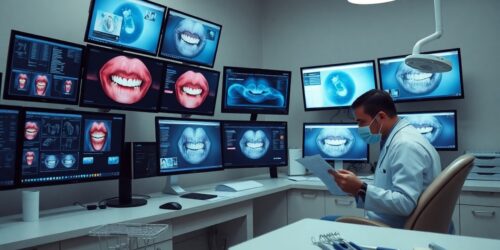Are Smart Dental Devices The Future Of At-Home Oral Health Monitoring?
Over the past few years, advancements in technology have led to the emergence of smart dental devices that promise to revolutionize your approach to oral health. These innovative tools aim to empower you to monitor your dental hygiene more effectively from home, providing real-time feedback and personalized care recommendations. In this blog post, we will explore the capabilities of these devices and examine whether they can truly replace traditional dental check-ups while enhancing your oral health routine.
Key Takeaways:
- Advancements in technology are making dental devices more accessible and efficient for at-home use.
- Real-time tracking of oral health metrics can lead to improved hygiene practices and proactive care.
- Integration with mobile applications enhances user experience and provides personalized feedback.
- Cost-effectiveness of smart dental devices may reduce the need for frequent dental visits, benefiting both patients and providers.
- Data-sharing capabilities facilitate better communication between patients and dental professionals for optimal care.
The Rise of Smart Dental Devices
To understand the future of oral health, it’s necessary to recognize the surge in smart dental devices that allow you to monitor your dental hygiene at home. Innovations such as smart toothbrushes, dental apps, and wireless oral health monitors are gaining traction, making it easier than ever for you to stay on top of your oral care routine. With these advancements, the landscape of dental health management is shifting, encouraging proactive habits for better long-term dental outcomes.
Overview of Current Technology
Technology in the dental field has evolved significantly with the introduction of smart devices designed for at-home use. These tools connect with your smartphone and offer real-time feedback on your brushing technique, track your usage patterns, and even remind you of your dental appointments. As a result, they empower you to take charge of your oral health like never before, creating a personalized care experience tailored just for you.
Benefits of At-Home Monitoring
To enhance your oral health, at-home monitoring provides an accessible way to maintain a consistent dental routine. These smart dental devices enable you to gather data about your brushing habits, gum health, and overall oral hygiene, giving you valuable insights for improvement.
Dental monitoring at home allows you to identify issues before they escalate, saving you time and money on potential treatments. Moreover, the convenience of tracking your progress fosters motivation and accountability, ensuring that you are committed to maintaining optimal oral health. By utilizing these technologies, you empower yourself to make informed decisions and adopt good habits for a lifetime of healthy teeth and gums.
Types of Smart Dental Devices
Some of the most innovative smart dental devices available today can greatly enhance your at-home oral health routine. These devices include:
| Smart Toothbrushes | Brushes equipped with sensors to track brushing habits. |
| Oral Health Apps | Applications designed to help you monitor your oral hygiene. |
| Smart Water Flossers | Devices that provide precise water pressure for cleaning between teeth. |
| Teledentistry Platforms | Virtual platforms that connect you with dental professionals. |
| Smart Mouthguards | Products that track your teeth grinding and sleep quality. |
After exploring these options, it’s clear that smart dental devices can play a significant role in optimizing your oral health routines. For more insights, check out The Latest News In Dental Care: A Look into the Future.
Smart Toothbrushes
With smart toothbrushes, you can track and improve your brushing techniques. These devices utilize built-in sensors and connectivity features to monitor the toothbrush’s movement and pressure, giving you real-time feedback through a connected app. As a result, you will have a clearer understanding of your habits, which can lead to better oral health outcomes.
Oral Health Apps
Types of oral health apps can help you maintain your dental hygiene more effectively. These applications often allow you to set reminders for brushing, flossing, or scheduling dental check-ups, ultimately encouraging you to stay committed to your oral health routine.
In fact, many of these apps even offer educational content tailored to your specific dental needs, such as how to properly floss or brush. Some apps allow direct communication with dental professionals, so you can ask questions and receive advice on oral care. By integrating these applications into your routine, you can elevate your oral health management effortlessly.
Integration with Dental Care
Not only do smart dental devices offer convenience for your daily oral hygiene, but they also provide a seamless integration with your dental care. With advancements detailed in The Modern and Digital Transformation of Oral Health Care, these tools can enhance communication and collaboration between you and your dental professionals, leading to improved health outcomes.
Professional Monitoring and Guidance
For optimal oral health, engaging with healthcare professionals is crucial. Smart dental devices not only help you track your oral hygiene habits but also allow for professional monitoring. This connection can enable dentists to offer personalized guidance based on your unique patterns, paving the way for tailored recommendations.
Data Sharing with Dentists
About sharing your health data, smart dental devices enable you to provide your dentist with real-time insights into your oral hygiene practices. This data sharing can transform the way your dentist understands and responds to your oral health needs.
Professional collaboration is augmented when you regularly share your data with your dentist. This practice ensures they stay informed about your habits, allowing them to make evidence-based recommendations. Consequently, your oral health can be monitored more effectively, fostering a proactive rather than reactive approach to dental care.
Impact on Patient Behavior
Many individuals find that smart dental devices positively influence their oral hygiene practices. With real-time feedback and reminders, these tools empower you to take control of your dental health. This proactive approach encourages regular check-ups and adherence to recommended care routines, ultimately fostering a more informed understanding of oral health. For more insights into how technology is shaping dental hygiene, visit Oral Health Tech: Future of Dental Hygiene | Blog – feno.co.
Encouraging Healthy Habits
Among the many benefits of smart dental devices is their ability to promote healthy habits in your daily routine. These tools provide personalized assessments that can guide improvements in your brushing and flossing techniques, ensuring you adopt the best practices for oral care.
Tracking Progress and Compliance
An necessary feature of smart dental devices is their ability to track your progress and compliance with oral health routines. This technology monitors your habits over time and provides valuable insights into your performance, helping you stay accountable and motivated to maintain good oral hygiene.
Progress reports generated by these devices allow you to visualize improvements in your oral health, such as better flossing techniques or more consistent brushing. By regularly reviewing this data, you can identify areas for improvement and adjust your habits accordingly, leading to a more effective oral care routine tailored to your needs.
Challenges and Limitations
After exploring the potential of smart dental devices for at-home oral health monitoring, it’s important to consider the challenges and limitations that may hinder their widespread adoption.
Data Privacy Concerns
Any data generated by your smart dental devices could raise privacy issues, as sensitive health information may be vulnerable to breaches. You must ensure the device you choose complies with data protection regulations and protects your personal information.
Accessibility and Affordability
Among the challenges to smart dental devices is their accessibility and affordability, which can vary widely. Not everyone may be able to invest in advanced technology for their oral health.
Accessibility for smart dental devices may be limited by geographic location, as not all regions have equal access to high-speed internet, which is often required for optimal device functionality. Additionally, the initial costs associated with purchasing these devices may deter some potential users, particularly those without dental insurance or with tight budgets. You may need to explore lower-cost options or innovative payment plans to make these tools more accessible for yourself and your family.
Future Trends in Dental Health Technology
Now more than ever, advancements in dental technology are shaping the future of at-home oral health monitoring. As smart dental devices become increasingly sophisticated, you can expect features like real-time data tracking, personalized health insights, and AI-driven recommendations to enhance your oral care routine. With growing awareness about the importance of preventive dental care, these innovations are likely to play a significant role in your overall health management.
Innovations on the Horizon
Health tech companies are actively developing new oral care solutions that leverage AI and machine learning. These innovations include smart toothbrushes that analyze your brushing technique and provide immediate feedback, as well as advanced oral health apps that remind you of appointments and track your dental hygiene progress. You could benefit from these technologies, making it easier to maintain optimal oral health from the comfort of your home.
Potential Market Growth
Beside technological improvements, the market for smart dental devices is expected to expand significantly. As more people recognize the value of preventive dental care and the convenience of at-home monitoring, demand for these innovations will likely grow, leading to increased investment and development in this sector.
But this growth isn’t just about providing new devices; it’s about creating a holistic approach to dental health. The rise of telehealth and a growing emphasis on preventive care is resonating with consumers, presenting multiple opportunities for companies to expand their offerings. As you explore these options, you may find that the integration of technology into oral health monitoring not only enhances your daily routine but also empowers you to take charge of your dental well-being.
Conclusion
From above, it is clear that smart dental devices have the potential to revolutionize at-home oral health monitoring. By integrating technology into your daily routine, you can gain invaluable insights into your dental hygiene, track progress, and receive personalized care recommendations. As these devices evolve, they may empower you to maintain better oral health and reduce the need for frequent dental visits. Embracing this technological advancement could be a significant step toward achieving a healthier smile.
FAQ
Q: What are smart dental devices?
A: Smart dental devices refer to advanced technology tools designed to monitor and improve oral health from home. These devices can range from electric toothbrushes with built-in sensors to smartphone-compatible dental cameras and oral health tracking apps, providing real-time data and personalized insights on dental hygiene practices.
Q: How do smart dental devices improve at-home oral health monitoring?
A: Smart dental devices enhance at-home oral health monitoring by providing users with instant feedback on their brushing techniques and habits. Many devices track metrics like brushing duration, pressure, and coverage, allowing individuals to identify areas that need more attention. Additionally, some devices connect to mobile applications, offering tips, reminders, and educational content tailored to the user’s specific oral health needs.
Q: Are smart dental devices suitable for everyone?
A: While smart dental devices are designed for a wide audience, their suitability can vary based on individual needs and preferences. People who enjoy integrating technology into their health routines may find these devices particularly beneficial. However, older adults or those unfamiliar with technology might require assistance or may prefer traditional dental care methods. It’s important to evaluate personal comfort levels with technology before deciding on whether to incorporate them into oral health routines.
Q: Can smart dental devices replace regular dental check-ups?
A: Smart dental devices are not meant to replace regular dental check-ups. While they can provide valuable insights and help maintain oral hygiene between visits, they cannot detect all dental issues or offer the comprehensive examinations that professional dentists provide. Routine dental check-ups are important for early detection of problems, professional cleanings, and personalized treatment plans.
Q: What are the potential drawbacks of using smart dental devices?
A: Potential drawbacks of using smart dental devices include reliance on technology that may malfunction or provide inaccurate data if not used properly. Additionally, the cost of high-tech devices can be a barrier for some users. Privacy concerns about data collection and sharing are also important to consider, as many devices require personal data to offer tailored advice. It’s important for users to research and choose devices from reputable manufacturers that prioritize data security.






